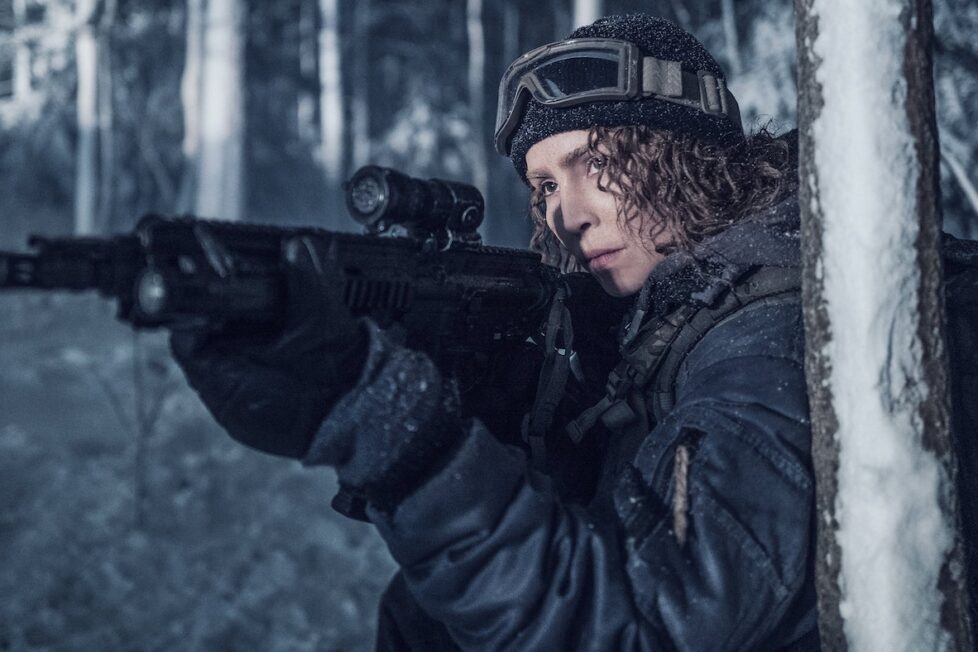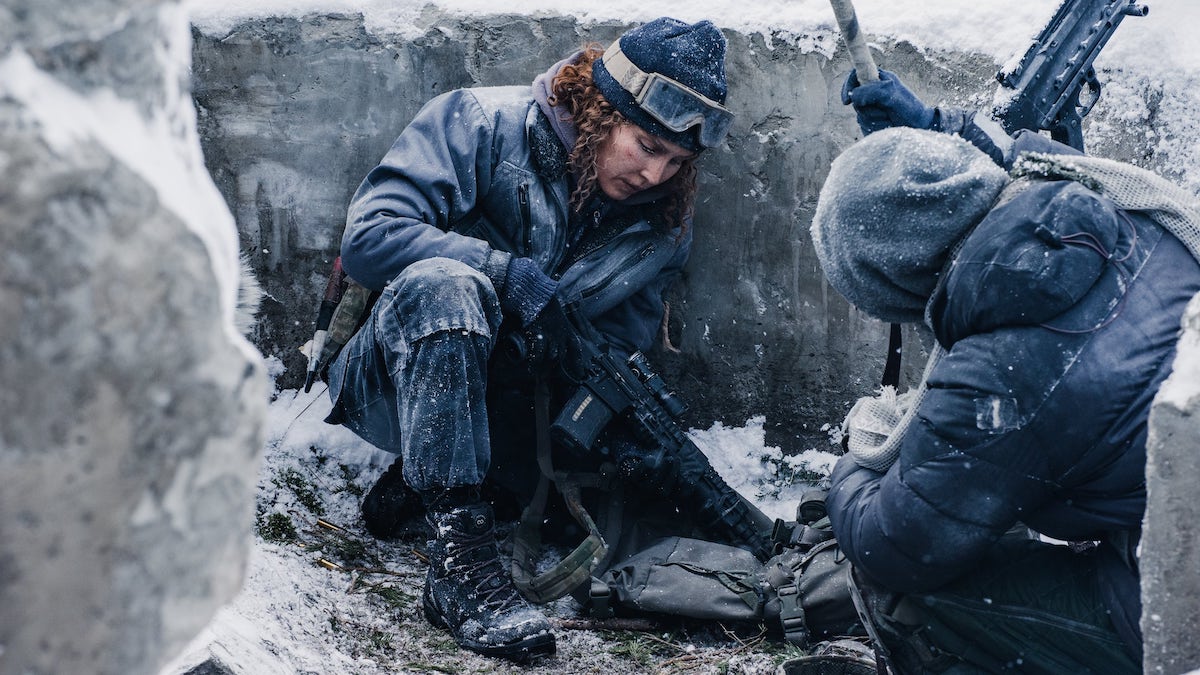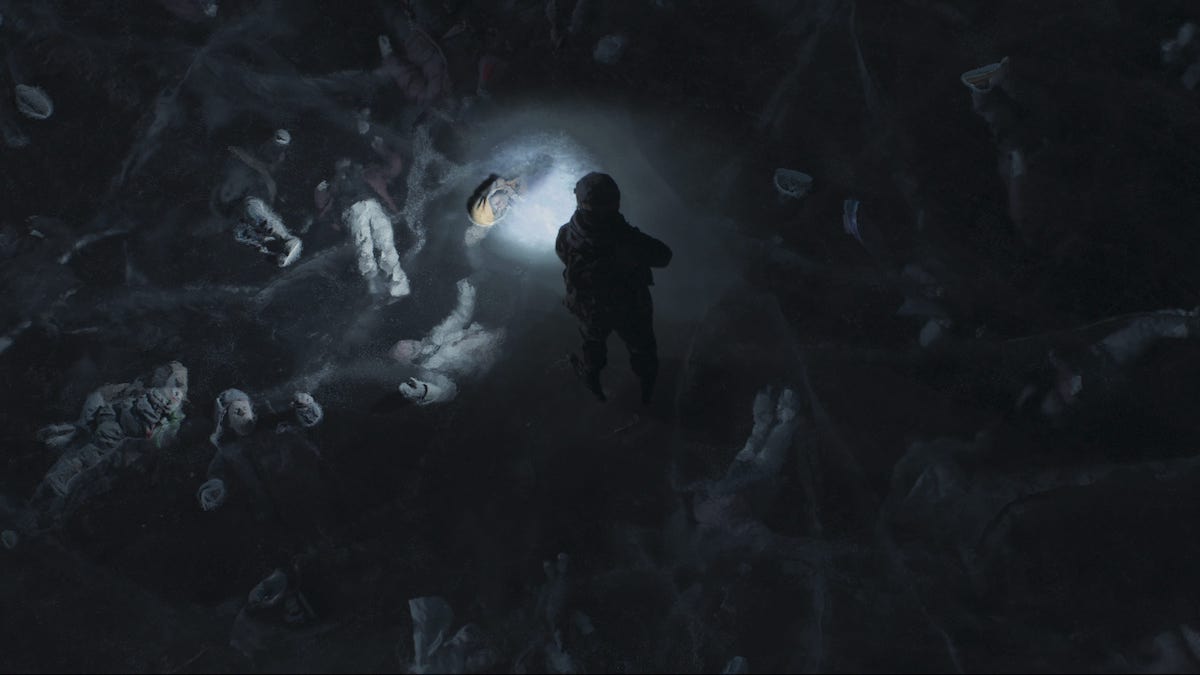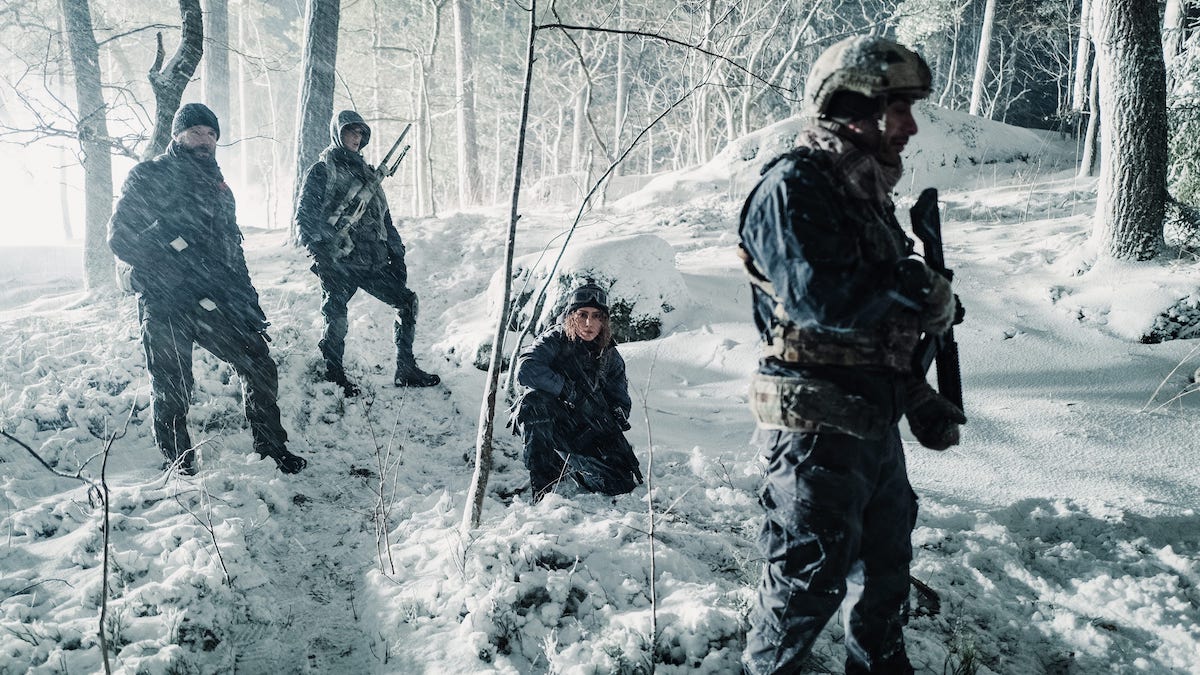BLACK CRAB (2022)
A group of Swedish soldiers must cross the frozen sea to save their war-ravaged country.

A group of Swedish soldiers must cross the frozen sea to save their war-ravaged country.


A huge hole in an apartment block; crowds of the displaced; automatic weapons everywhere; snow too. At several moments it’s easy to imagine Black Crab is a tactless exploitation of the current situation in Ukraine, but it was made before the conflict there erupted, and if it’s prescient, no doubt that derives from an awareness of the fractures that have been showing in Europe for a while.
The starting point in this adaptation of Jerker Virdborg’s novel is a civil war in Sweden, and the terrifying suddenness with which violence can tear at the most secure-seeming societies is well-portrayed as gunmen surround the traffic jam in which Edh (Noomi Rapace) is sitting with her young daughter. The occupants of cars are shot randomly; radio news commentary heard moments before suggests that the war, although not entirely new, has taken a sudden turn for the worse.
Soon after this, however, the film fast-forwards—apparently by some years—to a much greyer and dirtier world in which the conflict is still dragging on, and not going well for the side on which Edh is fighting, now without her daughter. (All the coverage describing Black Crab as “post-apocalyptic” seems to be leaping to erroneous conclusions. There’s no suggestion within the film of any kind of global collapse; this is just the realistic aftermath of protracted fighting.)

Of course, we’re likely to assume that Edh’s is the “good” side, although it’s both a strength and a weakness of Black Crab that the causes of the civil war and the ideologies involved are never explored at all—a weakness in that it leaves us unsure which outcome to hope for, but also a strength in that it forces us to recognise we just might be siding with “bad”, but nevertheless human, characters.
In any case, Edh soon finds herself assigned to a small group of soldiers told in their briefing by Colonel Raad (David Dencik) that “we’re about to lose the war”, and that (surprise, surprise) they’ve been picked for the mission that could avert defeat: they are to travel on ice skates across the frozen sea and deliver some vital materials to a research station.
The group—which also includes Malik (Dar Salim), Granvik (Erik Enge), Nylund (Jakob Oftebro) and Karimi (Ardalan Esmaili)—is warned never to open the containers with which they’ve been entrusted, and it doesn’t take a military genius to work out what they are likely to contain.

The bulk of the movie tracks their journey over the frozen archipelago, punctuated by occasional encounters with the disturbingly anonymous enemy (clad in winter gear with face masks), and also by light-bathed flashbacks to Edh with her daughter in more peaceful times. Inevitably, the numbers of the group are reduced in various incidents, and when the survivors finally do reach the research station, inevitably there is a further twist—one which, in fact, makes satisfying sense of what would otherwise be an annoying implausibility earlier.
There’s a risk something so high-concept could be ludicrous—skating to victory!— but Black Crab carries it off well, and some of the ice scenes are almost breathtaking: Edh’s group skims across the surface, toward the camera, as buildings burn away in the background. The blue-grey palette is evocative, and there is much imagination in varying the setting with unexpected items locked into the ice (a stranded car ferry, a wind turbine, dozens of deep-frozen bodies).
Among the cast, Rapace will be the most recognisable to non-Scandinavian viewers, especially as Lisbeth Salander in the three Swedish films of the Stieg Larsson Millennium series (The Girl With the Dragon Tattoo, etc.). Here, her Edh is a distinctive character; astute and ruthless but perpetually worried and suspicious.

Dencik may be familiar from many small roles in mainstream fare (like 2011’s Tinker Tailor Soldier Spy), and he makes a convincing, thoughtful Colonel Raad. Esmaili also stands out as the seemingly shifty, reluctant Karimi, while Enge as Granvik—the youngest member of the group—turns out to be not at all the sacrificial cipher you might expect, gaining in significance as the film progresses.
Many individual scenes are standard-issue war-movie elements, but director Adam Berg and his co-writers inject sufficient novelty to keep it interestingfrom moment to moment (the radio has an unusually important role, for example). It is a less overtly action-oriented film than the storyline might suggest, too, unhurried and unbothered by frenetic editing.
Even so, ultimately Black Crab isn’t as thoughtful as the filmmakers perhaps intended it to be. It doesn’t dig deeply into the moral questions it sets up, and at the film’s conclusion it’s not clear whether we’re supposed to automatically agree with the main characters’ actions…. and if so why, because we’ve been told so little about the details of this war.
As an action movie with an unusual premise, impressively photographed and decently acted, it certainly has greater than average intelligence. But it’s still, essentially, an action movie.
SWEDEN | 2022 | 114 MINUTES | 2.35:1 | COLOUR | SWEDISH


director: Adam Berg.
writers: Adam Berg & Pelle Rådström (based on the novel by Jerker Virdborg).
starring: Noomi Rapace, Aliette Opheim, Jakob Oftebro, David Dencik & Dar Salim.
